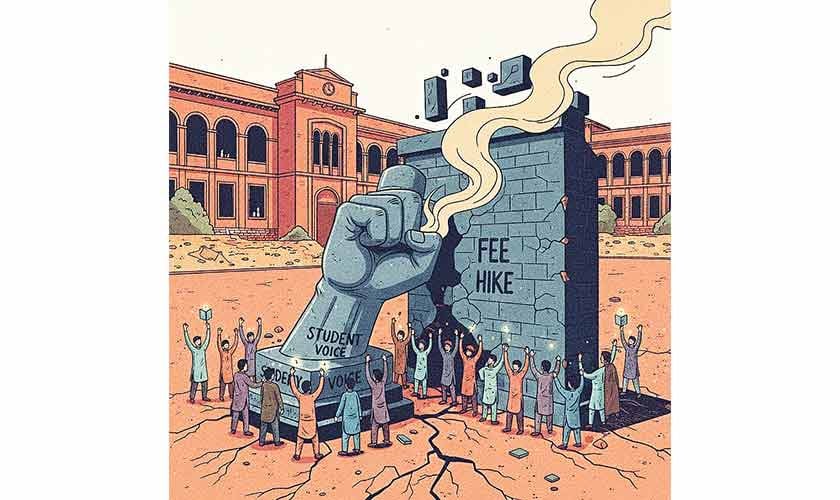The Quiet Menace at University of the Punjab: Campus Unrest Over Fee Hike
The quiet on the University of the Punjab (PU) premises is menacing—a stark and unsettling reminder of the brewing conflict between students and the varsity administration over the recent fee hike.
On September 24, the administration took a hard stance against protesting students. This disciplinary action, which included fines and probation, has ignited a fierce debate over who bears responsibility for the campus unrest.
Disciplinary Actions and Official Statements
PU spokesperson Dr. Khurram Shehzad confirmed that 37 students are facing disciplinary measures for violating university rules. Of these, 21 students were fined Rs 20,000 each for their alleged involvement in agitation and violence, while 15 others were placed on three-month probation. Additionally, the results of one student were withheld, and another student was banned from entering campus altogether.
According to Dr. Shehzad, the goal is to restore order and encourage responsible behaviour among students through a combination of penalties and counselling.
Student Groups Speak Out
The Islami Jamiat Talaba (IJT), one of the most active student groups at PU, views these measures as an attempt to suppress dissent. They contend that the administration is targeting them for speaking out against what they call an indiscriminate increase in tuition and hostel fees.
Highlighting the financial strain on students, an MPhil student from the Department of Development Communication shared that their hostel fee had doubled—from Rs 24,000 in 2024 to Rs 48,000 in 2025. The tuition fee has also seen a significant increase, he added.
The IJT argues that while the university claims to prioritise discipline, in reality, it is putting revenue ahead of the needs of students from middle-class backgrounds.
Administration’s Defense of the Fee Hike
Defending the fee hike, Dr. Shehzad explained, “Back in 2000, a student enrolling in an MSc programme would pay only Rs 1,200 per year. That fee remained unchanged for a long time, but it was not sustainable. Since there was no adjustment for many years, the recent fee hike feels sharp.”
He provided further context regarding the university’s financial pressures. A major source of revenue—from fees paid by private students taking BA and BSc exams—was eliminated due to a policy change. Simultaneously, government funding for higher education has been slashed drastically, shrinking from around Rs 100 billion in 2017 to about Rs 60 billion today.
Dr. Shehzad also noted that the university’s hostels are operating at a loss, offering accommodation at a fraction of the market rate—a model that simply cannot be sustained.
Campus Land Reclamation and Hostel Issues
The administration has recently driven to remove illegal occupants from campus land. Dr. Shehzad stated that land worth billions of rupees had been successfully reclaimed, allowing for some boys’ hostels to be converted into facilities for girls.
Mehr Zain, IJT nazim for the Old Campus, told The News on Sunday that while IJT initially supported this reclaiming effort, the administration later refused to provide rooms to legitimate occupants, including out-of-town students enrolled in evening programmes.
According to IJT, the university’s record revenue in recent years points toward a profit-driven motive rather than concern for students’ welfare.
Allegations of Policing and Suppression of Free Expression
The disputes extend beyond fees, with accusations of excessive policing and suppression of free speech on campus.
Fasih-ur Rehman, IJT spokesperson for PU, claimed that the university often allows police onto campus to quell even neutral student events. He cited an example in which students were questioned simply for participating in a peaceful Defend Pakistan rally.
Conflicting Accounts of the Student Rights March
The two sides also offer conflicting accounts of a recent Students Rights March. The IJT maintains that their peaceful march was blocked by armed security guards, leading to a scuffle. The administration, however, alleges that the IJT’s motive was to get approximately 100 expelled activists reinstated.
Further, the administration accuses IJT members of illegal activities, such as renting out hostel rooms and receiving free services. They claim the IJT is now lashing out after losing these privileges.
The Way Forward: Caught in the Middle
As this near-deadlock continues, regular students at PU find themselves trapped amid uncertainty and tension on campus. The unfolding conflict highlights the urgent need for a balanced dialogue that addresses both students’ financial concerns and the university’s sustainability challenges.
Only time will tell if the university and its student body can reach a resolution that restores peace and stability to the campus environment.
https://www.thenews.com.pk/tns/detail/1346832-institutional-conflict
